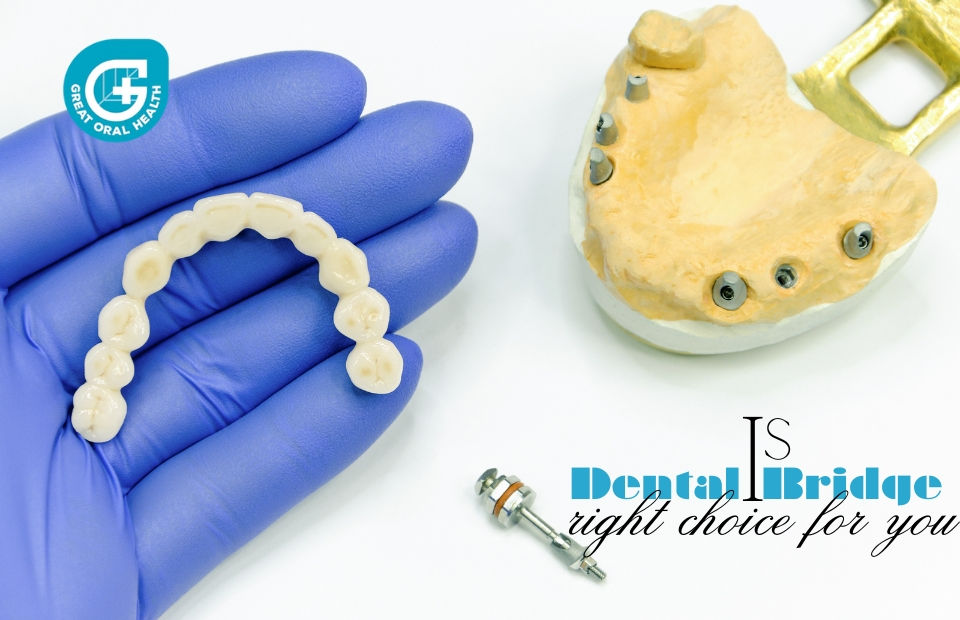Is a Dental Bridge the Right Choice for You?
- greatoralhealthinc
- Jun 23, 2023
- 3 min read
When considering tooth replacement options, it's important to assess which treatment is best suited to your specific needs. Dental bridges are a popular choice for replacing missing teeth, offering certain advantages and considerations. In this article, we will explore factors that can help you determine if a dental bridge is the right choice for you.

Table of Contents
Introduction
Dental Bridge Overview
Considerations for Dental Bridges
Suitability for Your Case
Consultation with a Dentist
Conclusion
Introduction
Dental bridges are prosthetic devices used to replace missing teeth. They consist of artificial teeth, known as pontics, that are anchored in place by dental crowns attached to adjacent teeth. If you have missing teeth, it's essential to consider the benefits and factors associated with dental bridges before making a decision.
Dental Bridge Overview
Dental bridges offer several advantages that make them a popular choice for tooth replacement:
Aesthetics: Bridges can provide a natural-looking appearance, restoring your smile and facial structure.
Functionality: They restore the ability to bite and chew properly, improving oral function and preventing issues associated with missing teeth.
Stability: Dental bridges are securely fixed in place, eliminating concerns about slippage or movement.
Cost-effectiveness: Compared to certain alternatives like dental implants, bridges generally have a lower upfront cost.
Discover More: Dental Implant Vs Dental Bridge – Which One Is Right For You
Considerations for Dental Bridges
While dental bridges offer many benefits, there are certain considerations to keep in mind:
Adjacent teeth: Dental bridges rely on the support of adjacent teeth. These teeth need to be healthy and strong enough to support the bridge. In some cases, preparatory work may be required to ensure a proper fit, which involves removing a small amount of enamel from the adjacent teeth.
Maintenance: Proper oral hygiene is crucial for maintaining the health and longevity of dental bridges. Regular brushing, flossing, and dental check-ups are necessary to prevent decay and gum disease around the bridge area.
Longevity: While dental bridges can last for many years with proper care, they may require replacement or adjustment over time due to wear and tear.
Suitability for Your Case
Determining whether a dental bridge is the right choice for you depends on various factors, including:
Number of missing teeth: Dental bridges are ideal for replacing one or a few missing teeth. If you have multiple missing teeth or a full arch, alternative treatments like partial dentures or implant-supported restorations may be more suitable.
Oral health: The condition of your gums and remaining teeth plays a significant role. Your dentist will assess the health of adjacent teeth and the overall state of your oral cavity to determine if a bridge is a viable option.
Bone structure: Adequate bone support is necessary for dental bridges. If you have experienced significant bone loss, alternative treatments such as dental implants may be recommended.
Consultation with a Dentist
To determine if a dental bridge is the right choice for you, it is essential to consult with a qualified dentist. They will evaluate your specific case, considering factors such as your oral health, the number of missing teeth, and your overall treatment goals. A dentist can provide personalized recommendations based on their expertise and knowledge of your dental health.
Discover More: What Is The Latest Technology In Dentistry?
Conclusion
A dental bridge can be an excellent choice for replacing missing teeth, providing aesthetics, functionality, and stability. However, the suitability of a dental bridge depends on various factors specific to your case. By consulting with a dentist and considering your oral health, the number of missing teeth, and your long-term goals, you can determine if a dental bridge is the right choice for you.



Comments